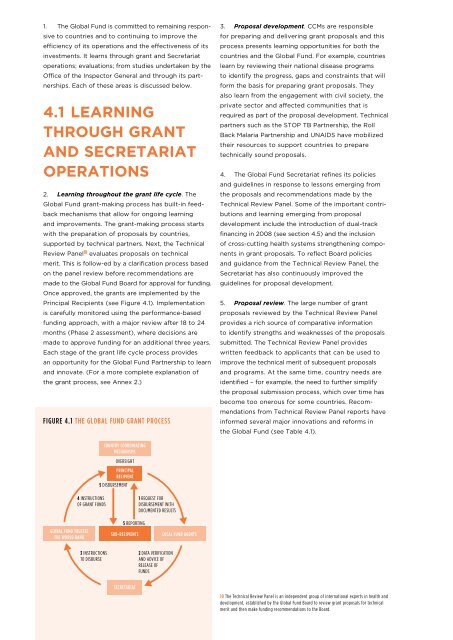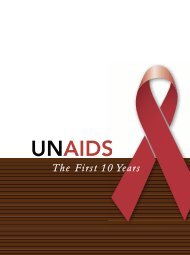Global Fund: Progress Report 2010 - unaids
Global Fund: Progress Report 2010 - unaids
Global Fund: Progress Report 2010 - unaids
You also want an ePaper? Increase the reach of your titles
YUMPU automatically turns print PDFs into web optimized ePapers that Google loves.
1. The <strong>Global</strong> <strong>Fund</strong> is committed to remaining responsive<br />
to countries and to continuing to improve the<br />
efficiency of its operations and the effectiveness of its<br />
investments. It learns through grant and Secretariat<br />
operations; evaluations; from studies undertaken by the<br />
Office of the Inspector General and through its partnerships.<br />
Each of these areas is discussed below.<br />
4.1 Learning<br />
through grant<br />
and Secretariat<br />
operations<br />
2. Learning throughout the grant life cycle. The<br />
<strong>Global</strong> <strong>Fund</strong> grant-making process has built-in feedback<br />
mechanisms that allow for ongoing learning<br />
and improvements. The grant-making process starts<br />
with the preparation of proposals by countries,<br />
supported by technical partners. Next, the Technical<br />
Review Panel 10 evaluates proposals on technical<br />
merit. This is follow-ed by a clarification process based<br />
on the panel review before recommendations are<br />
made to the <strong>Global</strong> <strong>Fund</strong> Board for approval for funding.<br />
Once approved, the grants are implemented by the<br />
Principal Recip ients (see Figure 4.1). Implementation<br />
is carefully monitored using the performance-based<br />
funding approach, with a major review after 18 to 24<br />
months (Phase 2 assessment), where decisions are<br />
made to approve funding for an additional three years.<br />
Each stage of the grant life cycle process provides<br />
an opportunity for the <strong>Global</strong> <strong>Fund</strong> Partnership to learn<br />
and innovate. (For a more complete explanation of<br />
the grant process, see Annex 2.)<br />
FIGURE 4.1 THE GLOBAL FUND GRANT PROCESS<br />
3. Proposal development. CCMs are responsible<br />
for preparing and delivering grant proposals and this<br />
process presents learning opportunities for both the<br />
countries and the <strong>Global</strong> <strong>Fund</strong>. For example, countries<br />
learn by reviewing their national disease programs<br />
to identify the progress, gaps and constraints that will<br />
form the basis for preparing grant proposals. They<br />
also learn from the engagement with civil society, the<br />
private sector and affected communities that is<br />
required as part of the proposal development. Technical<br />
partners such as the STOP TB Partnership, the Roll<br />
Back Malaria Partnership and UNAIDS have mobilized<br />
their resources to support countries to prepare<br />
technically sound proposals.<br />
4. The <strong>Global</strong> <strong>Fund</strong> Secretariat refines its policies<br />
and guidelines in response to lessons emerging from<br />
the proposals and recommendations made by the<br />
Technical Review Panel. Some of the important contributions<br />
and learning emerging from proposal<br />
development include the introduction of dual-track<br />
financing in 2008 (see section 4.5) and the inclusion<br />
of cross-cutting health systems strengthening components<br />
in grant proposals. To reflect Board policies<br />
and guidance from the Technical Review Panel, the<br />
Secretariat has also continuously improved the<br />
guidelines for proposal development.<br />
5. Proposal review. The large number of grant<br />
proposals reviewed by the Technical Review Panel<br />
provides a rich source of comparative information<br />
to identify strengths and weaknesses of the proposals<br />
submitted. The Technical Review Panel provides<br />
written feedback to applicants that can be used to<br />
improve the technical merit of subsequent proposals<br />
and programs. At the same time, country needs are<br />
identified – for example, the need to further simplify<br />
the proposal submission process, which over time has<br />
become too onerous for some countries. Recommendations<br />
from Technical Review Panel reports have<br />
informed several major innovations and reforms in<br />
the <strong>Global</strong> <strong>Fund</strong> (see Table 4.1).<br />
COUNTRY COORDINATING<br />
MECHANISMS<br />
OVERSIGHT<br />
PRINCIPAL<br />
RECIPIENT<br />
5 DISBURSEMENT<br />
4 INSTRUCTIONS<br />
OF GRANT FUNDS<br />
1 REQUEST FOR<br />
DISBURSEMENT WITH<br />
DOCUMENTED RESULTS<br />
GLOBAL FUND TRUSTEE<br />
THE WORLD BANK<br />
5 REPORTING<br />
SUB-RECIPIENTS<br />
LOCAL FUND AGENTS<br />
3 INSTRUCTIONS<br />
TO DISBURSE<br />
2 DATA VERIFICATION<br />
AND ADVICE OF<br />
RELEASE OF<br />
FUNDS<br />
SECRETARIAT<br />
10 The Technical Review Panel is an independent group of international experts in health and<br />
development, established by the <strong>Global</strong> <strong>Fund</strong> Board to review grant proposals for technical<br />
merit and then make funding recommendations to the Board.

















